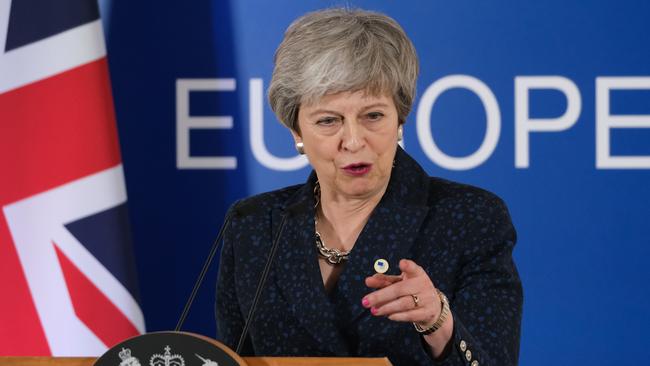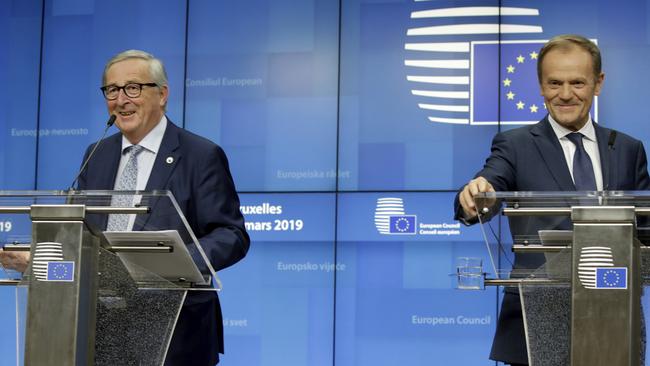Brexit Q&A: ‘Room in hell’ for MPs who vote down deal
European leaders have given British MPs two options. Here is a quick guide to what they mean for Britain.

What has the EU agreed?
European leaders have given British MPs two options. The first is that they approve Prime Minister Theresa May’s deal next week, in which case Britain will get an extension of Article 50 until May 22 to pass the legislation necessary to approve the deal.
If they fail to do this, EU leaders have pushed back the Brexit cliff edge until April 12. By that time Britain will have had to come up with an alternative plan that will include taking part in elections to the European parliament.
This plan would have to be put to a European summit and if agreed would unlock a much longer extension, possibly until the end of the year.
Does this mean Mrs May will bring back her deal for another vote?
No 10 Downing Street will need to bring a meaningful third vote to take place on Tuesday or Wednesday but needs House of Commons Speaker John Bercow to agree.
The Speaker has ruled that there must be “substantial changes” before it can be put to MPs but has not expanded on what he would consider substantial. Most believe that he would give Mrs May another go if he thought there was a good chance it would pass, in which case MPs could force the vote through. Critical to that calculation is whether Northern Ireland’s Democratic Unionist Party agrees to sign up to new reassurances on the backstop.
What happens if she wins?
Mrs May would have until May 22 to get legislation passed. It would take about two days to get Brexit Day changed. A short extension presents a challenging timetable for passing all the laws to leave in good order. It may also present opportunities for opponents to wreck or alter the deal.
What happens if she loses?
The EU has agreed to give Mrs May a three-week breathing space until April 12. However, there is still likely to be chaos.
Mrs May could still decide to pursue a no-deal Brexit and will come under intense pressure from the hard Right of her Conservative Party to do so. If she does, it will be very difficult for other MPs, a majority of whom have already twice expressed their opposition to a no-deal Brexit, to stop her.
The most straightforward option is to collapse the government via a confidence motion, but three weeks is still a very tight deadline for a new government to be formed in time to get a minister to move the statutory instrument necessary to delay Brexit and have it affirmed in each house of parliament.
If Mrs May does not adopt the no-deal option as policy she could propose shifting to a different kind of Brexit or (even less likely) offer a referendum or election.

Is there a chance the EU could offer a longer extension in this case?
Almost certainly, but it will come with conditions.
The most important will be that Britain agrees to take part in European elections and that British MEPs take up their seats.
It will also make clear that the extension cannot be used to renegotiate the withdrawal agreement. However, the political declaration will be open to changes if parliament votes for a closer relationship.
The EU could impose a “good faith” clause in any extension agreement. This would be an attempt to prevent a future Brexiteer prime minister from using Britain’s continued membership to bung up the EU decision-making process as a negotiating strategy.
Whether that could be enforced is a separate question. The extension is likely to be a year or more. However, it could come to an end early if and when Britain ratified the withdrawal agreement.
Can Article 50 be revoked?
Yes, unilaterally. But the thresholds for getting there are messy. Some believe that it would require full primary legislation to pass through parliament, whereas others differ over whether the prime minister would have to consent as well. It might be difficult to answer these complicated legal questions with hours to go before a no-deal Brexit.
From being almost inconceivable a month ago, revocation is now seen by some as the best option to avoid crashing out without a deal. A petition opened on the parliamentary website last month to call for revocation took off after Mrs May’s statement on Wednesday, attracting more than two million signatures in 48 hours. The number is still rising rapidly.
What does Donald Tusk think of MPS who don’t vote for Mrs May’s deal?
Speaking yesterday, the European Council president said, when asked if MPs who don’t vote for the deal should go to Hell: “According to our Pope, Hell is still empty. It means there are a lot of spaces.”
An aide then said: “This is the right moment to conclude the press conference.” Jean-Claude Juncker, the president of the European Commission, then chimed in: “Don’t go to Hell!”
The Times


